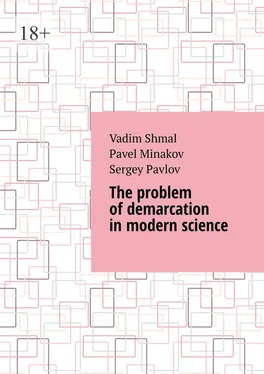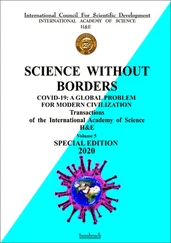Sergey Pavlov - The problem of demarcation in modern science
Здесь есть возможность читать онлайн «Sergey Pavlov - The problem of demarcation in modern science» — ознакомительный отрывок электронной книги совершенно бесплатно, а после прочтения отрывка купить полную версию. В некоторых случаях можно слушать аудио, скачать через торрент в формате fb2 и присутствует краткое содержание. ISBN: , Жанр: Прочая научная литература, Философия, на русском языке. Описание произведения, (предисловие) а так же отзывы посетителей доступны на портале библиотеки ЛибКат.
- Название:The problem of demarcation in modern science
- Автор:
- Жанр:
- Год:неизвестен
- ISBN:9785005532459
- Рейтинг книги:5 / 5. Голосов: 1
-
Избранное:Добавить в избранное
- Отзывы:
-
Ваша оценка:
- 100
- 1
- 2
- 3
- 4
- 5
The problem of demarcation in modern science: краткое содержание, описание и аннотация
Предлагаем к чтению аннотацию, описание, краткое содержание или предисловие (зависит от того, что написал сам автор книги «The problem of demarcation in modern science»). Если вы не нашли необходимую информацию о книге — напишите в комментариях, мы постараемся отыскать её.
The problem of demarcation in modern science — читать онлайн ознакомительный отрывок
Ниже представлен текст книги, разбитый по страницам. Система сохранения места последней прочитанной страницы, позволяет с удобством читать онлайн бесплатно книгу «The problem of demarcation in modern science», без необходимости каждый раз заново искать на чём Вы остановились. Поставьте закладку, и сможете в любой момент перейти на страницу, на которой закончили чтение.
Интервал:
Закладка:
The problem of demarcation in modern science
Vadim Shmal
Pavel Minakov
Sergey Pavlov
© Vadim Shmal, 2021
© Pavel Minakov, 2021
© Sergey Pavlov, 2021
ISBN 978-5-0055-3245-9
Created with Ridero smart publishing system
Demarcation issues
In philosophy of science and epistemology, the problem of demarcation is the problem of establishing the boundary between science and philosophy of science.
Philosophers often try to show the boundary between science and philosophy of science by delineating the boundaries between disciplines or dividing fundamental assumptions about reality, such as time and space, or objectivity and subjectivity, into different theories of reality, thereby understanding the boundary between the philosophy of science and the science of science. Although it is the subject of many questions in philosophy of science and epistemology, the problem of boundaries, usually, focuses on the nature of scientific realism as applied to science.
The boundary between science and the philosophy of science is so contested that the most common method used to divide a subject is to demarcate the boundary between methods that produce data (or results) and tools that enable the collection and analysis of data (e.g. ideas, laws, structures, models, etc.).
The differentiation of the methods and tools that are used from those that define the method and tools is critical in the demarcation problem because it determines which parts of science are science and which are not.
When someone tries to cross the frontier in science, he begins to consider the philosophy of science, and both can be seen as a form of research.
Boundary problem and boundary demarcation refers to the dichotomy between formal «science» conducted by scientists and their approach to data collection and their use of data collection results.
Questions of the demarcation problem concern these different ways of researching the natural world by scientists.
Many philosophical questions have been raised to try to define the boundary between science and the philosophy of science. Many philosophers have tried to find a «core» of fundamental beliefs held by scientific disciplines, which would allow us to separate scientific positions from the positions of the philosophy of science.
The theory of scientific realism, according to which scientific hypotheses can be derived from the real world and tested scientifically, is often the subject of controversy when delineating. According to these principles of scientific realism, it is generally believed that any theory of reality is at least partially correct, and that any claim to the contrary should be questioned. According to this theory, all scientific methods available to scientists (and everyone else) are equally effective and there are no gaps in human knowledge. It is a fundamental element of scientific realism that is often the subject of controversy between scientists and philosophers of science. This objection can be challenged with a slightly more technical side of the issue, citing the existence of many fundamental principles of science that are outside the realm of human knowledge, and for example, such things as the existence of certain numbers.
More humorously, the use of a physical model, and therefore the existence of a real equivalent to Newton’s Newton, is often used to refute many of the claims made by philosophers of science.
Cognitive or interpersonal realism theory suggests that science is not fundamentally different from social and artistic endeavors. These forms of inquiry are often criticized as a form of biased or unverifiable belief systems that lack a sense of objective or subjective «truth.» Some argue that these forms of research are, in a sense, simply human-made. Proponents of this view argue that there is a fundamental drive to explore and learn about the natural world, and that any claims about objective «truth» are subjective to that drive. These positions have been used in the past to challenge the ethics of how science can be used to influence a person’s beliefs or behavior. Summarizing this, we can say that any statement that is or can be made without an objective basis is not scientific.
Cognitive / intersubjective stance can be tested by asking people to answer questions about how scientists behave and what standards they use to validate their claims.
People who accept the theory and accept the creation of causal models in which the universe operates are considered credible if they provide the foundation for that theory through logic and consistency.
Thus, the use of the inductive approach is usually seen as a legitimate means of defining truth in science. However, the use of inductive inference to support any general theory can be criticized.
Arguments for the validity of the inductive approach include the following: the use of observations is generally biased and subjective, the data must be manipulated to arrive at valid conclusions, the data must be used causally, people may behave in a biased manner in reporting their observations, people who accept some scientific theory tend to have the best critical thinking skills, and objectivity and testability are often associated with pure science.
The controversy continues after more than two millennia of dialogue between philosophers of science and scientists in various fields, despite broad agreement on the foundations of the scientific method. When considering the work of modern researchers, the question often arises which elements of science are responsible for the outstanding discoveries of the last few decades: quantum mechanics, the theory of relativity, the Big Bang, the Large Hadron Collider, or, perhaps more recently, the Higgs boson. Indeed, at the forefront of all these achievements is the first principle of modern physics – the laws of nature do not change. However, in recent decades we have learned that some phenomena do change and that science is not a true fact of nature; it is a constantly developing company. However, by its very nature, science is very diverse, and understanding how different branches of science refer to these fundamental principles is critical if we want to understand the evolution of our knowledge. It is often noted that there is no reason to seek truth, because truth is inherent in nature. The philosopher Ivan Ilyin, born in Russia, pointed out that truth is not the same as wisdom. We can make great advances in science by exploring how reality works. By discovering how nature can collapse under its own weight, in the form of black holes or the Big Bang, we learn more about the universe than thinking about why it has the properties we observe. The philosopher Roger Scruton does not understand the nature of truth so easily, and he quotes Cicero: «I think that everything that is false at first glance seems to be right, because the question in question is the truth of what he says and does.» Scruton insists that truth has two distinct meanings, which he calls «manifestly incompatible and contradictory.» The first is the absolute truth, which must be arrived at through observation and experiment. The second is a subjective concept of truth based on the knowledge of personal experience to arrive at beliefs and decisions. Scruton considers this understanding to be the correct foundation for intellectual life. The logical conclusion follows from this that «criticality» – the idea that our beliefs are based on empirical evidence – and «intellectual rigor» – the pursuit of truth – are in fact complementary aspects of scientific endeavor. But as the philosophy of science advanced and we learned more about the fundamentals of nature, we saw that the very concept of «truth» is not literal. All of this has profound implications for the study of science.
Читать дальшеИнтервал:
Закладка:
Похожие книги на «The problem of demarcation in modern science»
Представляем Вашему вниманию похожие книги на «The problem of demarcation in modern science» списком для выбора. Мы отобрали схожую по названию и смыслу литературу в надежде предоставить читателям больше вариантов отыскать новые, интересные, ещё непрочитанные произведения.
Обсуждение, отзывы о книге «The problem of demarcation in modern science» и просто собственные мнения читателей. Оставьте ваши комментарии, напишите, что Вы думаете о произведении, его смысле или главных героях. Укажите что конкретно понравилось, а что нет, и почему Вы так считаете.












